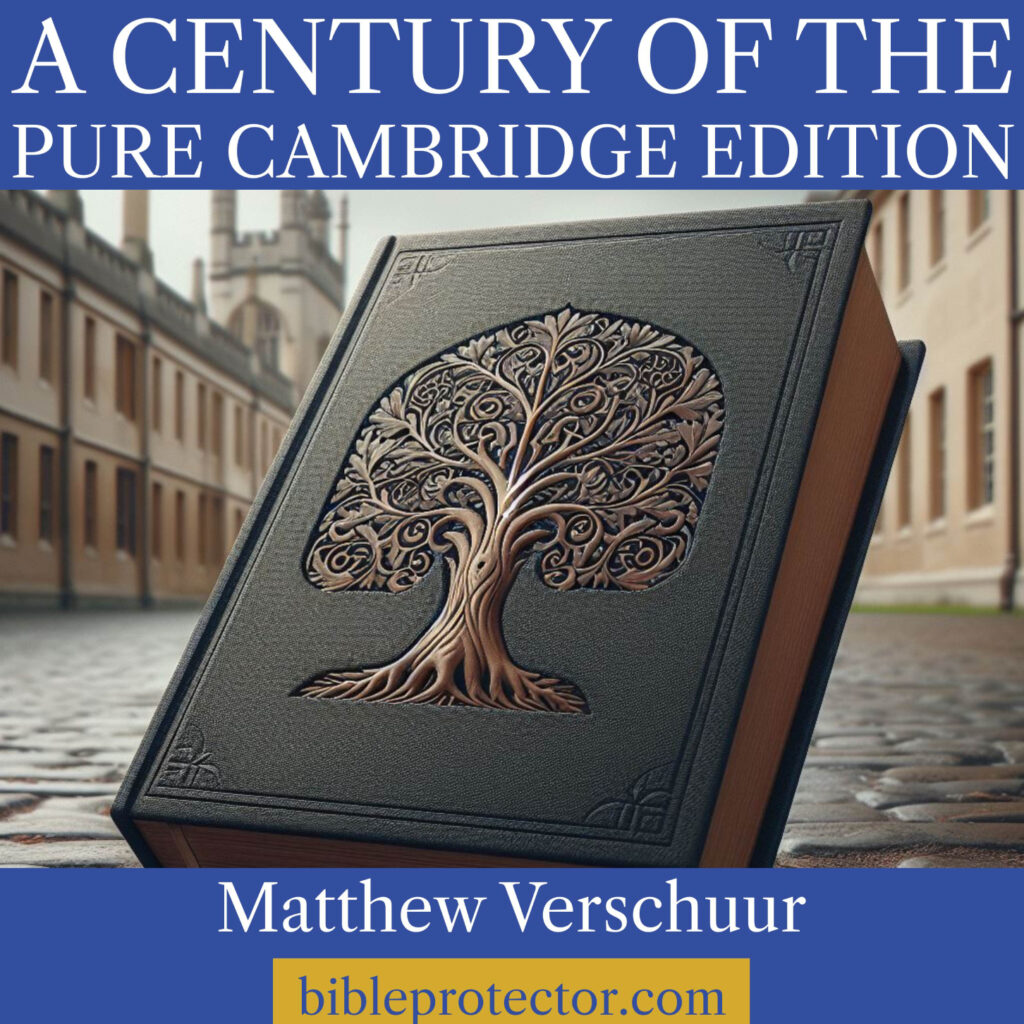PART ONE
Bryan Ross, an American Baptist pastor, used to believe that Matthew 5:18 was referring to the jots and tittles of Scripture.
For verily I say unto you, Till heaven and earth pass, one jot or one tittle shall in no wise pass from the law, till all be fulfilled. (Matthew 5:18).
Even Textus Receptus Onlyist D. A. Waite understood that this verse was speaking about the written Scripture, though he applied it to the original languages only, at least saw that it applied to the New Testament as much as it did the Old.
But Bryan Ross has come to question this interpretation altogether, seemingly denying God’s care for the very parts of letters of His Scripture, and now taking a position, in alignment with modernists, that this verse is only talking about promises in the Old Testament about Jesus, and not about the words and letters that contain those promises. In other words, Pastor Ross has completely disconnected the meaning of the passage from the implication that God’s words, God’s law itself, is made up of words and letters.
People win court cases over a comma in the constitution or a law! When we are told that God’s law is perfect, surely the very form of it, the very writing must needs be perfect in and of itself!
How did Bryan Ross come to question the obvious, natural interpretation of this passage? Well, he began by being bamboozled by walking by sight. Specifically, he read in a book by David Norton that there had been changes made by editors in the King James Bible. (How that was a shock to any Norman Normal out there, I don’t know.)
Now this is rather strange, since F. H. A. Scrivener had written about this in 1873 and 1884. And that D. A. Waite had made copies available of Scrivener’s book. I’d written about the subject since 2007 online too. So how is it that Bryan Ross turned to Norton’s book, and instead of thinking like I did, or like D. A. Waite did, he started to approach the thinking of Norton and began to think like the modernists?
And so, seeing editorial changes (more than just Norton’s data), he accepted elements of Norton’s perspective.
Bryan Ross has written, “My decision to use David Norton’s book A Textual History of the King James Bible to frame this discussion came under scrutiny this past week on social media. It has been asserted that Professor Norton is unsaved and therefore is not to be trusted in his reporting of textual data/facts. This assertion is coupled with the premise that Norton edited his own edition of the KJB from Cambridge University Press called the New Cambridge Paragraph Bible (NCPB). I have never supported or advocated for the NCPB. Just because Norton makes editorial decisions in his NCPB that I would not approve of does not mean that his presentation of the textual facts as it relates to the printed history of the KJB text are in error. One needs to distinguish between Norton’s cataloging of textual variants in the printed history of the King James text and his editorial work on the NCPB.”
I personally questioned why Bryan Ross was relying heavily upon Norton, but it certainly was not me who said that Norton could not be trusted in his reporting of data/facts. I in fact, do trust what he records about the 1611 to the present time. What I strongly disagree with is his interpretation of that data, his turning to an 1602 manuscript as being an alleged draft and his going to the original languages in how he then makes judgments on editing. (Besides his modernisation of the KJB and weird changes in places.)
Further, I said that it appeared that Norton was not an evangelical.
But if Bryan Ross is representing what I said, then he is grossly misrepresenting me, as badly as he has accused others of misrepresenting others.
Let me say that I am very much against the New Cambridge Paragraph Bible, and it is pleasing to see that Ross says he is also not advocating for it.
Bizarrely it appears as if he is attempting to lecture me on distinguishing between Norton’s catalogues and Norton’s editorial work, when that is exactly my position — has Bryan Ross read my materials?!
Norton’s method is to compare editorial variations in the printed history of the KJB with an annotated 1602 manuscript from the Bodleian Library (which may have been annotated after 1611) and reference to the original languages.
What Bryan Ross is fighting against is the simplistic idea that spelling changes and typographical errors are the only thing that ever happened in the printed history of the KJB. I understand that. But instead of taking a balanced or reasoned view (e.g. consulting multiple sources like Scrivener, Norris, me etc.) Ross has limited himself to only Norton. Now, I don’t actually advocate for the so-called “balanced” view, but that’s how modern academia works, which is that you should look at multiple perspectives when studying a discipline, not railroad yourself to the scholarship of one man.
Free self promotion here, but my material is freely available and Ross could use that to augment or “counterbalance” a sole reliance on Norton… of course, he could primarily follow in my path, which is at least is not discounting D. A. Waite and Gail Riplinger … and I am not 100% with either of those two people’s positions, but I think we should be fair and friendly and take up when teachers have said the right things or helped further the good cause of God’s words. To be very honest, I could not have written my monograph Glistering Truths without having read materials from both Waite and Riplinger.
So it almost looks like Byran Ross is disconnecting with all of one side, but connecting with Norton and liaising with anti-King James Bible agitator Mark Ward (without being in full agreement with either of those two.)
Though the warning is:
Can two walk together, except they be agreed? (Amos 3:3).
Continue reading

